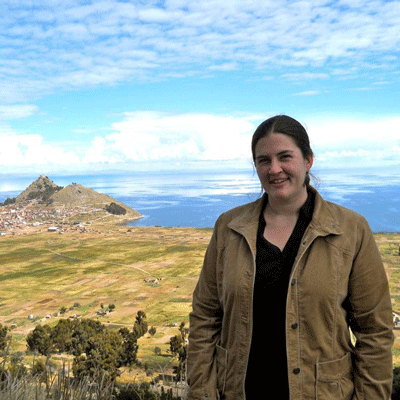Moderator: ‘There are no quick fixes’
January 5, 2024

Valéry Nodem
A recent Matthew 25 workshop on eradicating systemic poverty focused viewers’ attention on the importance of being willing to dig in “for the long haul” to help address deeply rooted problems in international communities.
The hourlong workshop by the Presbyterian Church (U.S.A.) featured a panel moderated by Eileen Schuhmann of the Presbyterian Hunger Program (PHP), who connected the overall topic — international accompaniment for sustainable development — with the church’s Matthew 25 invitation.
“Matthew 25 speaks to the importance of addressing systems rather than symptoms, and systems have been built over time; therefore, systems take time to address,” said Schuhmann, associate for Global Engagement and Resources for PHP. “There are no quick fixes in systems work. It can take years, decades or even longer for progress to be seen in systems work, so if we’re serious about eradicating systemic poverty, then we should be serious about committing to the long-term accompaniment of communities working for change.”
She tossed questions to a panel that included PHP’s Valéry Nodem, formerly of RELUFA, the Joining Hands Network in Cameroon; the Rev. Sarah Henken, a PC(USA) mission co-worker who collaborates with the Peace Commission of the Presbyterian Church of Colombia; and Dr. Rolando Pérez, an associate professor at Pontifical Catholic University of Peru, who collaborates with the Peace and Hope Association, a Christian human rights organization in Peru.
The panelists provided advice about how to accompany international partners in beneficial ways.

Dr. Rolando Pérez
Pérez said long-term accompaniment is an important part of building trust and allows for better assessments to be made.
“We need to live with the communities to whom we’re going to be helping, and that requires time, especially in the context like ours, like mine in Peru and South America, where people, because of the violence, because of oppression, they don’t have trust anymore, so we have to recover the trust,” he said.
Religious organizations, including the Presbyterian Church (U.S.A.), added their voices to advocacy campaigns against the contamination and pollution. “It is very interesting to see a very poor community that nobody knows of may feel hope because some people somewhere else are raising their voices. And, you know, they’re saying, ‘They don’t know anything about us, but they’re supporting us,’” Pérez said.
Nodem, PHP’s associate for International Hunger Concerns, encouraged viewers to delve beyond the surface when working with international communities and observing issues such as poverty. Asking questions can uncover structural issues and may reveal connections to your own homeland, he said.
When going into countries, it’s “good to know our own history in those countries” and to realize “we have a lot of work to do on our own end,” Nodem said. Sometimes, there are “a lot of historical factors” involved.
 He noted that in Cameroon, where PC(USA) and RELUFA have been active for years, “there’s a lot of corruption in the country, and a lot of companies in the U.S. are part of that corruption.” But there have been efforts, such as the Publish What You Pay Campaign, to create more transparency. He said it was gratifying to return to the country recently and see people continuing to trace how much money is flowing to government hands and trying to make sure it goes toward sustainable development.
He noted that in Cameroon, where PC(USA) and RELUFA have been active for years, “there’s a lot of corruption in the country, and a lot of companies in the U.S. are part of that corruption.” But there have been efforts, such as the Publish What You Pay Campaign, to create more transparency. He said it was gratifying to return to the country recently and see people continuing to trace how much money is flowing to government hands and trying to make sure it goes toward sustainable development.
Pérez said it’s important to remember that you don’t have all the answers when coming into a community.
“We never just start from zero,” he said. “… We’re always continuing with the work that somebody else has done in the past. … We have to learn what they did before,” but the “temptation is always to arrive thinking that we’re bringing something new and it’s not always like that.”
And even after a problem appears to be resolved, it’s important to stick around for a while. “The challenge is to remain to see the after-damage” because the community is still hurting, he said. “That’s where religious communities and organizations may support something.”
The Presbyterian Hunger Program is one of the Compassion, Peace and Justice ministries of the Presbyterian Mission Agency.
Darla Carter, Communications Strategist, Presbyterian Mission Agency
Today’s Focus: Presbyterian Hunger Program hosted a Matthew 25 workshop on eradicating systemic poverty
Let us join in prayer for:
PC(USA) Agencies’ Staff
Jacklyn Walker, Mission Specialist I, World Mission’s Director’s Office, Presbyterian Mission Agency
Beth Waltemath, Communication Associate, Communications Ministry, Presbyterian Mission Agency
Let us pray
Gracious God, you have created us to be a diverse people. Teach us to learn from our differences, so that we might bear witness to the rich diversity that makes up the body of Christ. Give us wisdom. Grant us peace. Amen.


No comments:
Post a Comment